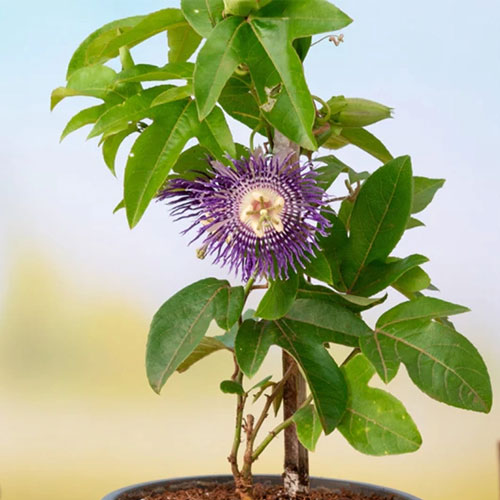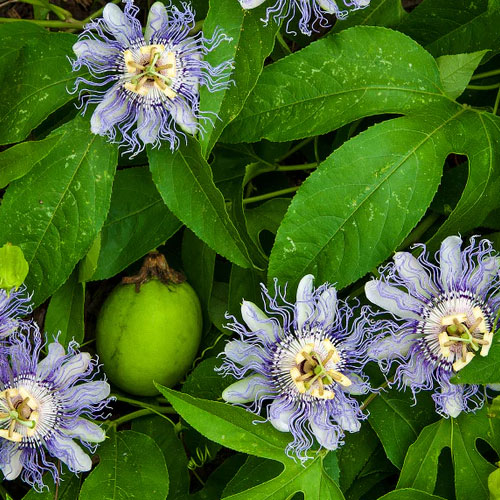Bring home divine beauty with the Krishna Kamal Flowering Plant, also known as Passion Flower Vine or Passiflora Incarnata. This ornamental creeper is admired for its stunning purple flowers and sacred symbolism in Indian culture. The flowers resemble the mythological representation of Lord Krishna’s aura and are perfect for spiritual gardens, balconies, or fences. This 1.5 to 2 feet healthy live plant is easy to grow, fast to climb, and blooms beautifully with minimal care. A fantastic addition to every garden lover’s collection!
Type of Plant: Flowering Creeper (Live Plant)
Botanical Name: Passiflora incarnata
Common Names: Krishna Kamal, Passion Flower, Rakta Pushp, Paan Pushp
Plant Height: 1.5 to 2 feet
Sunlight Requirement: Full Sun to Partial Shade
Soil Type: Loamy or sandy well-drained soil
Watering: Moderate, regular watering (avoid waterlogging)
Fertilizer Needs: Organic compost or liquid fertilizer twice a month
Where to Grow: Outdoor Garden, Balcony, Terrace, Fences, Temple
Growing Season: Spring to Summer
Support Required: Yes (Trellis/Fence/Arches)
Maintenance Level: Low
Flower Color: Purple with white and blue accents
Ideal Pot Size: Minimum 12x12 inch grow bag or large pot


Krishna Kamal thrives best in the Indian spring to summer season. It starts actively growing during warmer temperatures and blooms prolifically in sunny conditions. The plant prefers 20–35°C and does well in tropical and subtropical regions across India.
To grow Krishna Kamal in pots:
Use a 12-inch or larger pot with drainage holes.
Fill with a mix of garden soil, cocopeat, and compost.
Place near a railing or balcony with good sunlight.
Use a support stick or trellis for creeping.
Preparation: Select a sunny location with good soil drainage.
Planting: Transplant the plant with soil from its original pot.
Watering: Keep soil moist but not soggy.
Growth Support: Use vertical support or allow the plant to trail on grills/fences.
Fertilization: Feed with compost or vermicompost every 15 days.
1. Apply Nutrient-Rich Fertilizers
When your plants begin flowering, use nutrient-rich fertilizers like Organic Bone Meal Powder or Vermicompost. This helps in boosting the bloom and enhances overall yield.
2. Use Organic Fertilizers
Feed your plants with organic fertilizers such as Cow Dung Manure or Neem Cake. Organic options promote healthy soil life.
3. Regular Feeding
Apply fertilizers every 20-25 days to ensure plants receive a steady supply of nutrients. Choose from various options like Cocopeat Compost for moisture retention.
Sunlight: Needs 4–6 hours of direct or filtered sunlight.
Soil: Use nutrient-rich, slightly acidic, well-drained soil.
Fertilizer: Use compost or seaweed extract every 2–3 weeks.
Pruning: Prune during early spring to control shape and encourage new growth.
Pest Control: Use neem oil or soap spray if needed.
Mulching: Add dry leaves or cocopeat around the base to retain moisture.
Krishna Kamal is more than a plant—it’s a spiritual symbol. Its extraordinary star-shaped purple flower is associated with Lord Krishna in Hindu mythology. The plant emits calmness and enhances any sacred or ornamental garden. Its creeping habit makes it ideal for vertical gardening. The unique structure of its petals captivates everyone, making it a favorite among collectors and garden designers.
Religious significance: Linked to Lord Krishna and spiritual symbolism.
Medicinal uses: Traditionally used in Ayurveda for calming and anti-anxiety effects.
Garden beauty: Stunning flowers that bloom abundantly.
Air purification: Adds greenery and improves air quality.
Avoid overwatering the plant, especially in the rainy season.
Ensure proper drainage in pots to prevent root rot.
Avoid placing in completely shaded areas—sunlight is essential.
Prune regularly to avoid overgrowth.
Yellow leaves: Could be due to overwatering. Let soil dry before next watering.
No blooms: Move to a sunnier location and add phosphorus-rich fertilizer.
Pests: Treat with neem oil every 15 days as a preventive measure.
Slow growth: Ensure adequate sunlight and feed with compost regularly.
Krishna Kamal, Paanpushp, Rakta Pushp, Krishna Phool, Raktkamal, Paan Phool, Rakthapushpam, Krishna Kamala, Kovil Krishna Kamal, Krishna Mallige, Krishna Malar, Krishna Chempakam.
Q1: Can Krishna Kamal be grown indoors?
A: It prefers outdoor sunlight but can be grown on sunlit balconies.
Q2: Does this plant need regular pruning?
A: Yes, mild pruning encourages better branching and flowering.
Q3: Is it suitable for trellis or railing decoration?
A: Absolutely. It’s one of the best plants for vertical support.
Sign in now to receive a 5% instant discount on your first order when using code WELCOME. Begin your organic journey today!
By logging in, you're agreeing to our Terms of Service and Privacy Policy.
Pradeep
Beautiful purple-white flowers regular bloom kar rahe hain.
Himani
Krishna Kamal Passion Flower Vine plant healthy aur fresh condition me mila.
Oviya
Plant strong roots ke sath aaya aur transplant easily hua.
Gaurav
Golden Hills hamesha acchi quality live plants deta hai.
Komal
Bahut sundar Krishna Kamal flowers aaye, garden me divine look deta hai.
Divya
Golden Hills Farm se hamesha healthy plants milte hain.
Eshan
Backyard garden ke liye perfect flowering vine hai.
Bhavana
Healthy aur pest-free plant deliver hua, packaging tight thi.
Jagdish
Bahut unique aur spiritual flowering vine hai.
Lalita
Packing safe tha aur koi damage nahi hua delivery ke time.